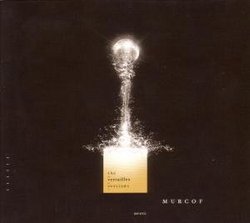Headphone Commute Review
Headphone Commute | 08/20/2009
(5 out of 5 stars)
"I am way overdue to give this album a proper review. I first heard The Versailles Sessions back at the end of 2008, when this Leaf release immediately made it on to my Best of 2008 list. Then, as time flew by, I was expecting to cover the upcoming release, Océano. The latter is expected to be a fourth installment in a five part album series, that spells out Fernando Corona's shortened Murcof alias with the initial letters of the titles (Martes, Ulysses, Remembranza, Cosmos, Océano, F___?). Alas, Océano is still in post-production. Meanwhile, The Versailles Sessions still haunts me at night. During the 50-minute experience, the instruments howl, screech, and cry in a tormented industrial prison of sound. Intense heartburn of horror rises through the pulled and scratched strings until it spills over into the bile of harmony. Rhythmic structure ignores the background beating of sacrificial drums, as the violins tune up into the unison of terror. Darkness surrounds all, as the melodies creep up the underground stairs towards the purity of light. In The Versailles Sessions, Murcof creates one of the most dramatic, suspenseful and cinematic soundtracks to date. The imaginary film consists of the images from the annual festival of sound, light and water at the Chateaue de Versailles. The score is composed entirely out of 17th century instruments, such as harpsichord, flute, violin and viola de gamba, and is performed by a troupe of professional baroque musicians. This commissioned release for the festival's Les Grandes Eaux Nocturnes, is unlike any of Fernando's previous albums. In 2002, Martes hit the scene to overwhelming critical acclaim, juxtaposing samples of Arvo Pärt and Morton Feldman over deep rolling bass and micro programmed beats. The Mexican producer followed up his debut with an even more elegant and mature production. With Cosmos, you simply fly away (a must, in any serious connoisseur's library). But The Versailles Sessions stands out completely in its own spectrum of compositions. The dark ambient and modern classical passages haunt the listener into a corner of eerie memories and distant fears, evoking an unnatural response of increased blood pressure and cold sweat. Highly recommended for the likes of Deaf Center, Julien Neto, releases by Alva Noto + Ryuchi Sakamoto, Kangding Ray, Dictaphone and Arovane. If you're digging around to complete your Murcof discography, pick up Corona's release as Terrestre, Secondary Inspection (Static Discos, 2004), and Terrestre vs. Plankton Man (Nimboestatic, 2004) as well as his collaboration with H.Amézquita, C.I.D.I. (AR) (Statis Discos, 2004), and his latest work with Erik Truffaz, titled Mexico (Blue Note, 2008). Best of 2008 for sure!"
Baroque Meets Drone
J. Preston | Melbourne, Australia | 02/12/2009
(4 out of 5 stars)
"Since his quite gorgeous debut album "Martes", Murcof's albums seem to have become progressively more eclectic (in terms of instrumentation) and progressively more disconcerting, and "Versailles Sessions" certainly does nothing to alter that trajectory.
You won't be surpirsed to find that the music here is at once sparse and densely atmospheric, but you may be surprised to find that virtually all the prominent instrumentation used here can be dated to the baroque. The electronic influences on this album (don't be fooled, there are many - this album is masterfully produced) are subtle and - with the exception of the last track - rarely made the primary focus of the music.
My one complaint with the album is that it seems somewhat disjointed. My view is that if you're going to produce an album which relies primarily on the atmosphere of the pieces to draw the listener in, then you're going to want to make sure that they flow in such a way that the listener is not frequently snapped out of his reverie with sudden, unanticipated changes in the nature of the music. The opening track, for instance, is suitably droning and ominous, but it gives way to an abrasively off-key violin in the second track, which in turn gives way to a choral dirge in the third track, itself concluding with the idiosyncratic baroque plonks of a harpsicord!
This is a minor quibble though and there is much otherwise to like about this album, though fans of Murcof should be warned: "Versailles Sessions" is something of a departure from his earlier work."


 Track Listings (6) - Disc #1
Track Listings (6) - Disc #1